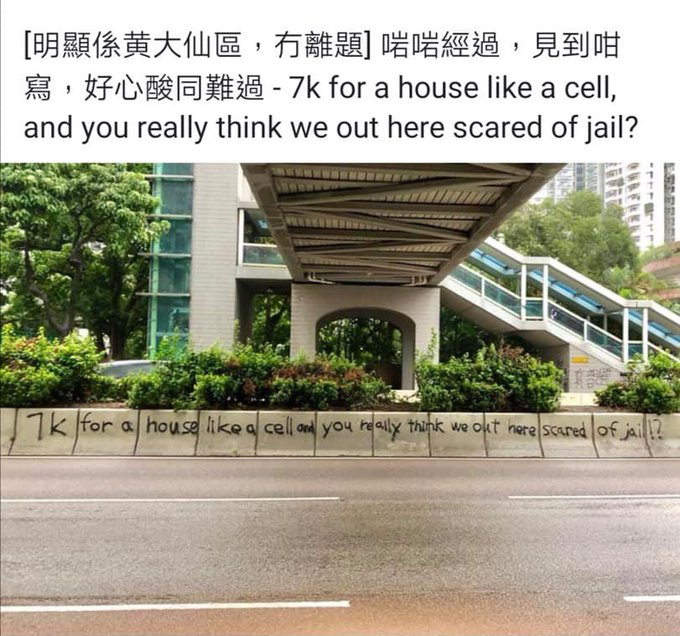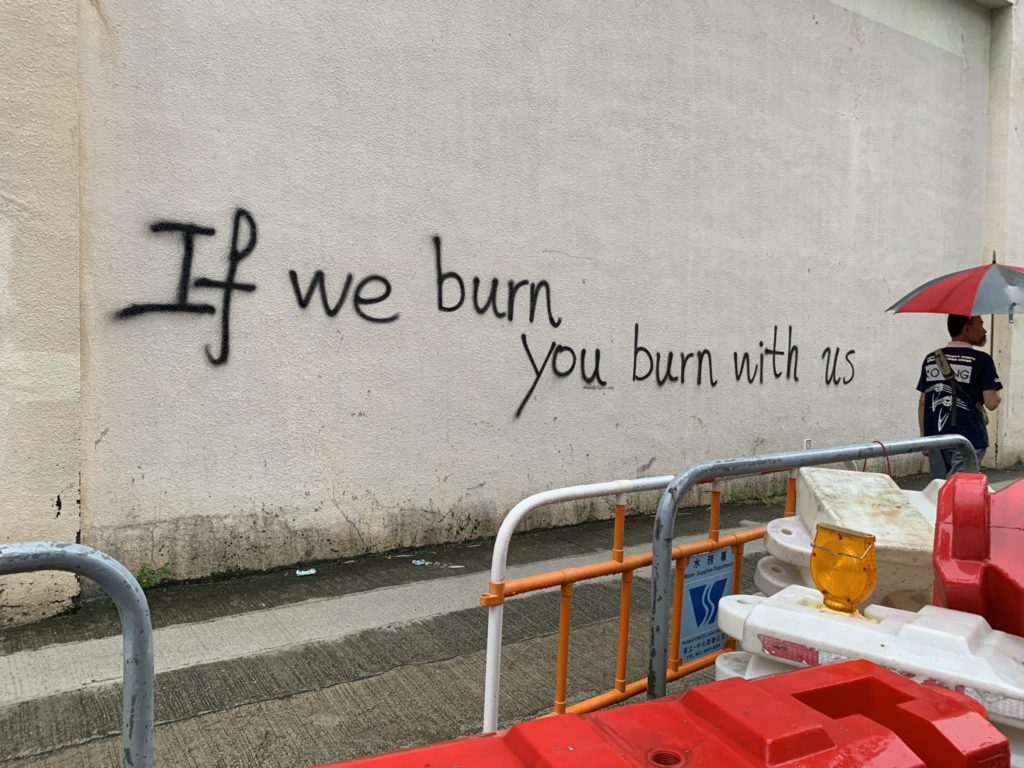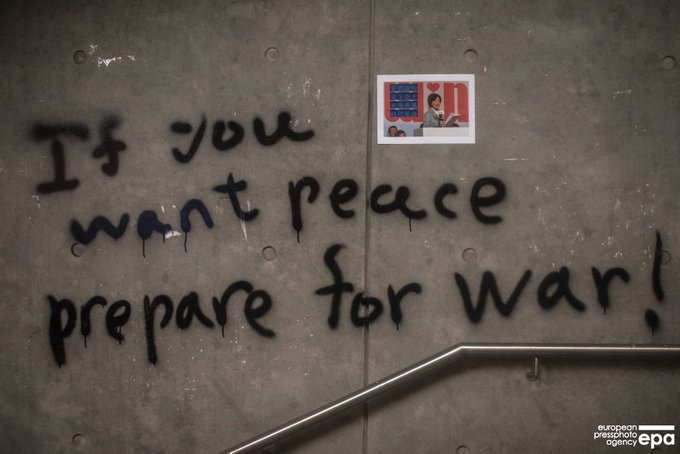– an introduction to the chronology “Hong Kong latest!”
by Sam Fanto and GD
On August 18, 2019 , the Hong Kong state tried to buy off the movement with a HK$19 billion (2.18 billion euros) relief package that, apparently, had nothing to do with the movement: “Tax cuts previously announced for this year’s budget will be beefed up: salaries tax, tax under personal assessment and profits tax for 2018-19 will be reduced by up to 100 per cent, with a ceiling of HK$20,000. Chan estimated that 1.43 million taxpayers will benefit from the measures, which will cost the government HK$1.84 billion. The government will also provide one extra months’ payments to social welfare recipients, as well as those receiving the Old Age Allowance, Old Age Living Allowance and the disability allowance. Students in kindergarten, primary school and secondary school will each receive a HK$2,500 subsidy. Households will receive a one-time HK$2,000 subsidy for their electricity bill, and lower-income tenants living in public housing will have their rents waived for one month. Chan added that the Community Care Fund was in the process of developing one-off subsidies for low-income families not currently benefiting from the government’s welfare policies – also known as the “N-nothing” demographic. The government also announced that 27 types of fees and charges would be waived, among a set of measures aimed at benefitting small and medium enterprises.”
This set off some vague drifting meanderings, off the top of our (GD’s and my) heads:
At first we thought that this finance-based sop to the movement is not going to work at all – after all, this movement is not specifically about what are traditionally defined as “material” issues by Leftists or Marxists (as if other factors, such as the mainland’s all-pervasive technology of social control, are less “material”). However, economic inequality and lack of opportunity to achieve the vaguely “middle-class” standard of living that all workers are supposed to aspire to is a component (and certainly not a negligible one) of the constellation of dissatisfactions that power the HK rebellion. The two denials of a future – denial of a decent/tolerable economic life and the denial of a tolerable public social/cultural life – condition much of the despair that animates the remarkable levels of militancy and solidarity of HK youth and their supporters. ” Hong Kong people, in one of the richest places in the world, work long hours and return to homes little larger than cubicles. It’s a city where many young people — even college-educated ones — have little to no chance of owning a decent home, and are condemned to lives riddled with financial anxiety. Now people have had enough. “ – here
The open commitment of the most overtly parasitic classes – the tycoons, the triads, the most opportunistic strand of civil service, notably the cops – to the Beijing regime, and the outstanding commitment to what (in spite of its constituent contradictions and incoherence) is an idea of an autonomous civil society, implying a great deal of difficult complexity (to put it mildly) reconciling the elements of freedom and autonomy with the elements of “free trade”, has created a chasm that is not going to be easy to bridge.
We began to reflect on historical precedents that have little to do with HK but which may have some element of comparison with it (after all, no situation is totally unique).
During the 1980s, as the South African revolution overcame many of the carefully-nurtured divisions of apartheid, the state and capital threw vast amounts of money at the movement – including wage rises of 200% or more; certainly social security benefits were a great deal higher in real terms than they’ve been since that scumbag Mandela came to power. However, we’d guess (though we haven’t researched it) that these increases in the social wage gave many people hope of reform, even if they didn’t hope for it under apartheid. And gave them hope in the reformist section of white rule (de Klerk, etc.). Likewise (though this is almost certainly not a conscious strategy of the current government in HK, or at least not that section of the government totally servile to Xi ) we wonder if this will give some people an idea of an economically better life should one or two of the oppositional dissidents/reformists compromise and negotiate their way to some kind of power-sharing with sections of the Chinese bureaucracy (maybe, long-term, a Chinese de Klerk in rivalry with Xi). A vaque and somewhat nebulous prediction should this movement continue beyond the inevitable coming repression. Which it is very likely to do, in some form or
another: “Even if the movement gradually dies down from this point on it has long-lasting impacts. Many people gained a kind of political consciousness. This is not something you can erase instantaneously,” said Wong, an academic focusing on social movements in Hong Kong, who prefers not to give his full name. “Probably you won’t see the same frequency and intensity but that doesn’t mean it’s over. Because once people have been woken up, they can’t be put back to sleep,” he said.” – https://www.theguardian.com/world/2019/aug/17/hong-kong-three-rallies-mark-11th-weekend-of-protests .
All this is fairly nebulous because we have no idea about the current conflicts amongst the HK and Beijing’s ruling class in relation to this movement (though this article gives some glimpses into their problems). And we doubt many people have much idea as such conflicts are behind firmly closed doors. But there are bound to be significant differences of opinion, however fearful the reformist wing may be of Xi’s moves towards absolute power, overly rigid moves that this current movement must surely make some of the rulers question. We know that democracy is moving closer towards totalitarianism (e.g. Modi, in India, shutting down internet access in Kashmir – https://www.theguardian.com/world/2019/aug/08/kashmir-communications-blackout-is-draconian-says-un-envoy); maybe people should also look at how some sections of totalitarian power are moving towards “democracy”, at least as an image of reform necessary to placate those who find an unbending bureaucracy impossible. The structural lines along which the deepening splits are being configured indicate the seriousness and potential irreversability of the antagonisms within HK that the actions of Beijing are driving to breaking point. There are a large number of people in HK who want these splits to be bridged because if they’re not they could lead to an EXPLICITLY anti-commodity, anti-hierarchical, anti-economic revolution. Though not the case right now, the desire for economic advance within this system (however much it’s a mirage that evaporates as soon as you seem to get close to it) could be the basis for such future reform.
All this is not being expressed for the moment, but is certainly a future possibility. Though it’s historically very very different from HK, reform in South Africa became an essential prerequisite for the return to capital accumulation-as-usual back in the beginning of the 1990s and had been encouraged, from the mid-80s onwards, by significant sectors of capital there. Such a reform certainly helped the black middle class and subsequent section of the ruling class – but was, and still is, devastating for the working class majority, worse in so many ways than apartheid. (see : http://dialectical-delinquents.com/2013-a-to-z-of-some-moments-of-international-opposition/s/south-africa-the-latest/ )
Of course, all this is more a long-term take on the situation.
More immediately a heavy crack-down is very likely, possibly shortly after the 70th anniversary of the establishment of the People’s Republic of China on October 1st, though this is most likely to be some martial law situation. Beijing seems to be posturing with its threats of a Tiananmen Square, following Sun Tzu’s advice in The Art Of War – “ The art of war is of vital importance to the State. It is a matter of life and death, a road either to safety or to ruin. Hence it is a subject of inquiry which can on no account be neglected... All warfare is based on deception… Appear weak when you are strong, and strong when you are weak… when we are able to attack, we must seem unable; when using our forces, we must appear inactive; when we are near, we must make the enemy believe we are far away; when far away, we must make him believe we are near ” . A state of emergency declared by Lam & co., last invoked during riots in 1967, under British colonial rule, now seems the most likely development, as happened in Poland at the end of 1981, giving the aura of local control as opposed to tanks sent from Beijing (or, as in East Europe in the 50s and 60s, from Moscow).
In terms of its structure, Hong Kong is not Beijing: much of it is far more a close-knit city of close-knit streets, and tiny apartments (e.g. buildings 6 storeys high turned into 12 storeys by cutting in half each storey so that people can virtually only lie down in them).

Given this, it’d be far harder to organise a massacre that wouldn’t kill loads of people the state would not want to kill, including its allies, than in Tiananmen Square. Mass imprisonment, a few deaths (in Poland ’81 6 miners were killed; probably other people also, but not a massacre), troops everywhere, strikes and demonstrations forbidden, only pro-state media allowed, an internet shutdown, etc. Maybe a few killings by cops or soldiers, but repression can take far subtler forms than a ‘simple’ massacre. Whilst the threat of a Tiananmen Square constantly hovers in the background of this movement, more likely is a massive crackdown on the more radical elements, and the image of reform involving (long-term, probably) getting rid of Lam, replacing her with one of the official dissident leaders (or at least, involving him/her in the process of negotiations and the image of reform) and perhaps justifying the repression with a “Red Brigade”-type manipulation (not that Sanguinetti’s depiction of what happened in the late 70s is really accurate, but that’s another question) to help with the marginalisation of the more radical sections, some of whom are already being classified as “terrorist”. “Red Brigade”-type manipulation ” is not quite what I mean. More a combination of what possibly happened with the Red Brigades and the Piazza Fontana massacre in Milan. That is, a section of the more radical youths infiltrated by undercover cops or other loyal state functionaries, instigating a massacre of innocents so as to give the epithet “terrorist” a more obviously accurate attribute than the current descriptions of anti-state violence (carried out largely in response to cop beatings, etc.) by one of the world’s more blatantly violent terrorist states. Of course, what the state manipulates is always a surprise and often doesn’t totally imitate historical precedents, but then the movement can also surprise us in its response or in its initiatives. Apart from developing and publicising subversive ideas commensurate with the radicality of many of its acts, one thing the movement ought to do if it wants to keep one step ahead of this world (this old senile world still trying to give the appearance of youth on its deathbed) is to withold, not use and not publicise tactics for the moment that could be of far greater use during a crackdown, because the state is keeping tabs on the various imaginative strategies and will definitely try to anticipate their use in response to any future repression. “Let your plans be dark and impenetrable as night, and when you move, fall like a thunderbolt … Engage people with what they expect; it is what they are able to discern and confirms their projections. It settles them into predictable patterns of response, occupying their minds while you wait for the extraordinary moment — that which they cannot anticipate…If you know the enemy and know yourself, you need not fear the result of a hundred battles. ” – Sun Tzu, The Art of War. Of course, all these quotes from Sun Tzu are generalities that can be used by both sides, even if the side of the struggle for freedom is not, unlike in conventional warfare between 2 opposing powers or would-be powers, at all equivalent to that of Beijing.


Leave a Reply